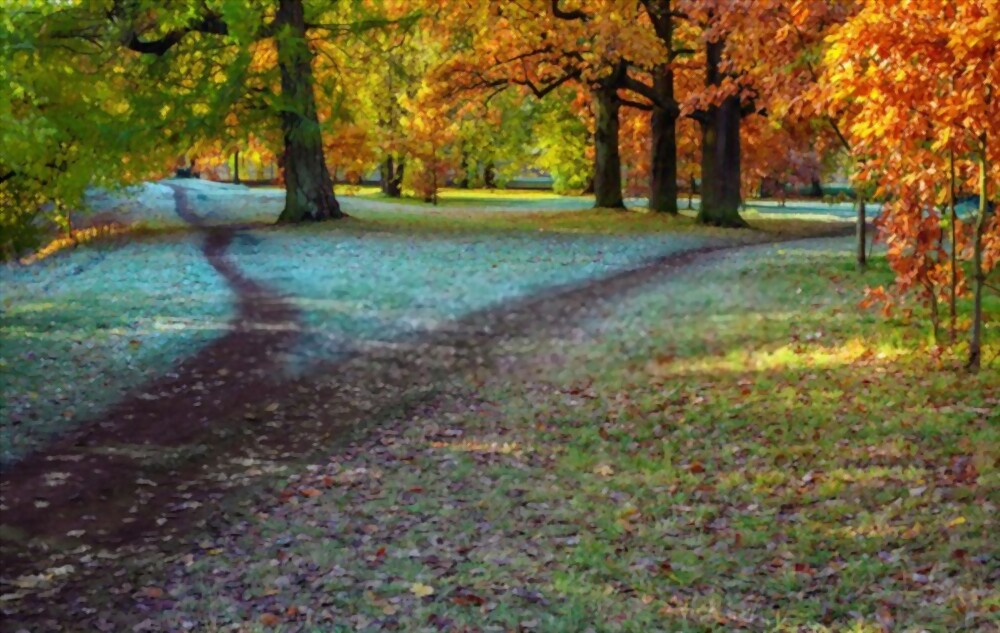
Two roads diverged in a yellow wood,
And sorry I could not travel both
And be one traveler, long I stood
And looked down one as far as I could
To where it bent in the undergrowth;
Then took the other, as just as fair,
And having perhaps the better claim,
Because it was grassy and wanted wear;
Though as for that the passing there
Had worn them really about the same,
And both that morning equally lay
In leaves no step had trodden black.
Oh, I kept the first for another day!
Yet knowing how way leads on to way,
I doubted if I should ever come back.
I shall be telling this with a sigh
Somewhere ages and ages hence:
Two roads diverged in a wood, and I—
I took the one less traveled by,
And that has made all the difference.
Two roads diverged in a yellow wood,
And sorry I could not travel both
And be one traveler, long I stood
And looked down one as far as I could
To where it bent in the undergrowth;
Then took the other, as just as fair,
And having perhaps the better claim,
Because it was grassy and wanted wear;
Though as for that the passing there
Had worn them really about the same,
And both that morning equally lay
In leaves no step had trodden black.
Oh, I kept the first for another day!
Yet knowing how way leads on to way,
I doubted if I should ever come back.
I shall be telling this with a sigh
Somewhere ages and ages hence:
Two roads diverged in a wood, and I—
I took the one less traveled by,
And that has made all the difference.
One of Frost’s most well known poems which people tend to incorrectly remember its title as ‘The road less traveled’. This is a narrative poem meaning it is a poem that tells a story. It was written in 1915 for Frost’s friend Edward Thomas which later inspired him to fight in WW1 with fatal consequences.
Frost and Thomas were great friends while Frost was living in England, both were well-read and loved walking. They frequently took long walks together observing nature in the English countryside. This inspired Frost to write this poem about their walks and often Thomas’s indecisiveness about which route to take. Frost’s time in England ended abruptly in 1915 with war in Europe about to break out. He returned to the United States fully expecting his friend to follow him but he did not.
When Frost’s poem arrived in the mail Thomas was at a crossroads in his own life as to whether to leave Europe or join in the war effort. Frustrated by his own lack of achievement compared to his good friend Frost, who seemed to mock him at his indecisiveness by way of this poem, he decided to enlist in the army and fight in the war. While ‘The road not taken’ wasn’t the only thing that made Thomas enlist for the war it was definitely a factor. Tragically, Thomas was killed in the Battle of Arras on April 9, 1917.
The poem contains four stanzas of five lines each. The rhyme scheme is ‘ABAAB’ meaning the first line rhymes with the third and fourth and the second line rhymes with the fifth. The meter, is basically iambic tetrameter, with each line having four two-syllable feet, though in almost every line, in every position, an iamb is replaced with an anapest.
Now back to the content of the poem itself. Where do I start. There’s so much to say that one could literally write a book about this! The first thing you will notice is the spelling of traveler, immediately telling you the writer is American. In England it is written as traveller. Secondly, ‘yellow wood’. Those of you that have taken walks through the woods of Northern Europe will know what I mean. In autumn the leaves are a multitude of colours ranging from red to yellow, golden and brown and the air is cool and crisp yet musty. It is one of my favourite times of the year. My mood is often melancholic as the fun and joy of summer has passed and it’s time to get your head down and work. You are naturally in a contemplative mode.
The decision to take the other route seems ambiguous because at first he says ‘it was grassy and wanted wear’ then later says ‘had worn them really about the same’. It just highlights some weakness in the narrator. Indecisive and unsure of himself. At the end he decided to take the road less travelled which supposedly made a difference. What is not known within the poem is whether it had a positive or negative impact on the traveller.
